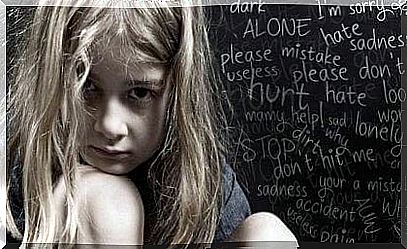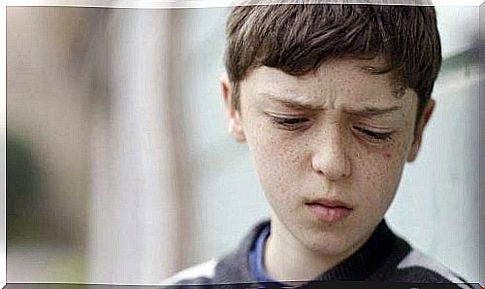Verbal Abuse In Childhood Leaves Its Wounds

Verbal abuse in childhood directly affects a child’s health. However, we are not aware of all of its effects. This is because we sometimes confuse it with the use of ugly words. But it goes much further than that.
Verbal abuse in childhood is a direct attack on the victim’s self-esteem. In this case, the attack is aimed at children. In addition , abuse in the form of words can also involve abuse on a psychological level. The National Child Traumatic Stress Network (NCTSN) actually has data on this. According to them, psychological abuse is the most common type of violence.
It is very important that we as parents are careful about what we say to our children. That is why we should control the way we speak to them. We should be especially careful when pointing out mistakes they make.
There is a reason why verbal abuse in childhood leaves an important mark behind. This is because childhood is a very critical stage of development. The nervous system and brain are very vulnerable to stimuli from the environment. Therefore, everything that happens on the outside will affect the child in one way or another.
According to J. Pinel , neurodevelopment takes place from conception to the fetal period. Then it goes on to the period after birth and does not end until adulthood. As this is the case, it is normal for children to be susceptible to neuropsychological damage during childhood.

A publication called Review of the Neuropsychology of Childhood Abuse: Neurobiology and the Neuropsychological Profile of Abuse Victims During Childhood has relevant information. It points out that verbal abuse during childhood can cause attention and memory problems, as well as difficulties with language and intellectual development. This can lead to academic failure.
But in what ways do we hide this phenomenon? We call it by other names; sometimes we justify it by calling it “teaching” or “upbringing”.
Many parents do not know how to raise children in any other way than by focusing on the bad. When the child, on the other hand, does something good, it is not mentioned. This is because they think that is the way it should be. If a child addresses this, parents tend to say, “But that’s what you should do.”
But in this fragile stage, focusing on negative things will have serious consequences. Most of the time, the parents do not even tell what the child has done wrong, and in addition make them feel guilty. To this we can add bad word choices when we convey these messages to the children.
Comparing one child to another and saying “you are stupid” may seem innocent to some. It can even feel justified when parents feel so annoyed that they lose their temper. But all this can leave a permanent mark in the child’s mind. This is especially true when this happens frequently.
For example, let’s say your child is trying to solve a math problem and you call her “stupid” who fails on the first try. At the same time, you emphasize that her friends always manage it. In this case, the child will think that it is bad at math. In addition, she will believe that she is a worse student than her peer.
Immediately the conviction emerges that she can do nothing about it. This leads to her rejecting math in the future, and may also be afraid of failure. At the slightest failed attempt in any field, she will give up because she sees herself as “incapable”.

What kind of self-image do we expect our children to develop with this type of behavior? Let us not forget that during childhood they build up their identity.
This identity can be characterized by “I am not worth anything”. It can also include “it’s my fault my parents are angry.” There may even be “I can not do anything right” or ” I am stupid”. The child may think “I deserve the worst”. All this hinders the creation of a solid self-esteem.
As we can see , verbal abuse in childhood is something that affects them deeply and in a significant way. We must also mention that parents are often unaware of what they are projecting on their children. They can often project frustrations from work, high stress levels, relationship problems or the pressure from their responsibilities. They project this on their children through their language.
You should keep this in mind if you want your children to be happy. It is important to be able to manage our emotions adequately. We should also have empathy for our children and above all communicate positively with them. We should always keep their self-esteem in mind.
After all, we would not want them to be shy, sad adults. Adults who think they are incapable of doing things and who in the long run will limit themselves.









